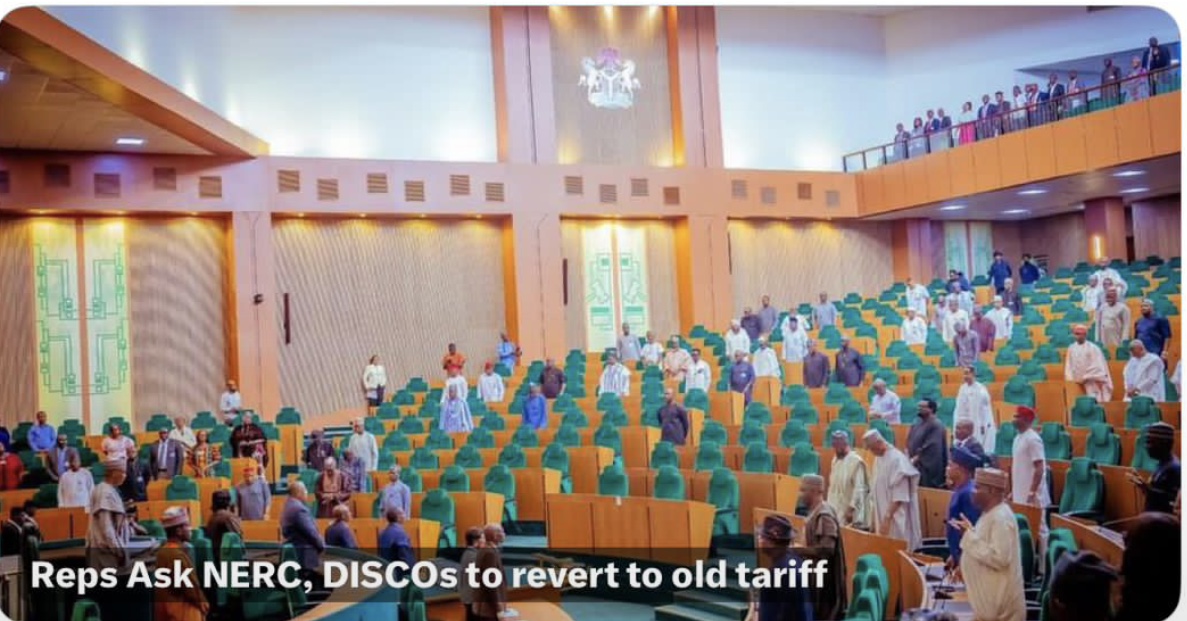In a significant move aimed at alleviating the economic pressures on Nigerian citizens, the House of Representatives has directed the Nigerian Electricity Regulatory Commission (NERC) and Electricity Distribution Companies (DISCOs) to revert to the old electricity tariffs. This directive comes in response to widespread public outcry over the recent tariff hike, which has placed an additional burden on households and businesses across the country.
Over the past few months, Nigerians have experienced an increase in electricity tariffs, justified by NERC and DISCOs as a necessary adjustment to reflect the true cost of electricity production and distribution. The new rates were intended to cover the rising costs of generating and maintaining electricity infrastructure, ensure consistent power supply, and encourage investment in the sector. However, the timing and magnitude of the increase have sparked considerable debate and dissatisfaction among consumers, many of whom are struggling with the rising cost of living.
The House of Representatives’ Intervention
Recognizing the hardship imposed by the increased tariffs, the House of Representatives has intervened, calling for a return to the previous rates. This decision underscores the legislative body’s commitment to protecting the welfare of the Nigerian populace. The lawmakers argue that the timing of the tariff increase is particularly problematic, given the ongoing economic challenges faced by many citizens. They emphasized the need for a more phased and considerate approach to tariff adjustments that takes into account the financial realities of everyday Nigerians.
The directive from the House of Representatives has been met with widespread approval from the public. For many Nigerians, the high cost of electricity has not only strained household budgets but also impacted businesses, especially small and medium enterprises that rely heavily on power for their operations. Consumers have voiced their relief at the decision, hoping it will provide some economic respite and stabilize their financial situations.
While the directive is a positive step for consumers, it presents several challenges for NERC and DISCOs. These organizations must now navigate the complexities of adjusting their billing systems to revert to the old tariffs while ensuring they can still cover operational costs and invest in infrastructure improvements. There is also the risk that reverting to lower tariffs could affect the quality and reliability of electricity supply, given the financial constraints it might impose on the service providers.
Implications for the Electricity sector’s
The Nigerian electricity sector has long faced issues of underfunding, inefficiency, and infrastructural decay. This move by the House of Representatives highlights the delicate balance needed between maintaining affordable electricity tariffs and ensuring sustainable and reliable power supply. Going forward, there will likely be increased scrutiny and dialogue around how best to manage tariff adjustments in a way that protects consumers while fostering growth and stability in the electricity sector.
NERC and the DISCOs are now tasked with implementing the House of Representatives’ directive. This will involve not only adjusting their billing systems but also effectively communicating the changes to consumers to avoid confusion and ensure a smooth transition. Additionally, there may be a need for further discussions on sustainable ways to fund and improve Nigeria’s electricity infrastructure without disproportionately affecting consumers.
The government and relevant stakeholders will also need to explore alternative strategies to attract investment and enhance efficiency in the sector. Potential measures could include increased public-private partnerships, exploring renewable energy sources, and enhancing regulatory frameworks to ensure transparency and accountability.
The directive from the House of Representatives to revert to the old electricity tariffs reflects a sensitive and responsive approach to governance. It highlights the importance of balancing economic realities with the needs of the populace. As Nigeria continues to navigate its economic challenges, such interventions are crucial in ensuring that the welfare of its citizens remains a top priority.
The path forward for Nigeria’s electricity sector will require careful planning, collaboration, and innovative solutions to address both the immediate needs of consumers and the long-term sustainability of the power supply system.
